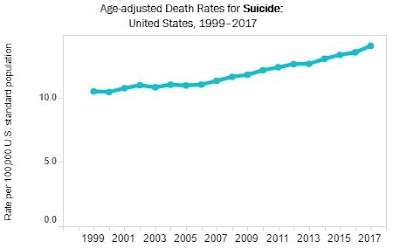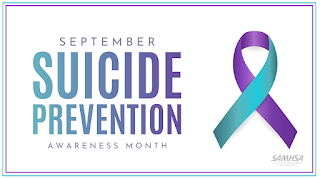Will Suicides Increase Because of COVID-19?
Recently, we have been hearing concerns about whether the suicide rate may increase as a result of the COVID-19 pandemic. Right now, anxieties are already elevated because of this novel situation. We all know that - more than ever before - our focus must remain on facts, not fear. In order to help our readers consider that very complex question, let's start by reviewing facts we know about suicide.
In this blog post from 2019, we talked about the World Health Organization's latest data on suicide, which indicated that between 2010 and 2016, the global suicide rate decreased by 9.8%. However, the WHO also found that the only region to see an increase was the Americas. According to the CDC's surveillance data, suicide is currently the 10th leading cause of death in the United States and suicide rates have shown a steady pattern of increase in the United States:
The CDC also provided a list of risk factors or characteristics associated with suicide, but they clearly indicate that these ARE NOT direct causes. These days, our personal lists of risk factors may look different than they did a month ago. As a nation, we are enduring self-imposed isolation, loss of social relationships, and possible financial hardships.
So, let's get back to the question of an increasing rate of suicides because of COVID-19. It's a complicated question with an even more complicated answer. Data tell us that suicide has been an enduring problem in the United States that has progressively gotten worse over time. Following that data trend, it would be reasonable to expect that suicides may continue to increase. Our personal risk factors associated with suicide may be changing during these unprecedented times but, as a reminder, there's no evidence that any single risk factor or any set of these factors will CAUSE suicide.
In our world of psychology and data, there's always the caveat that "correlation does not equal causation." As of right now, there's simply no way that even the most renowned experts in the field can predict the exact impact of the COVID-19 pandemic on our nation's - and even the world's - mental health. A combination of individual, relationship, community, and societal factors contribute to the risk of suicide. The American Foundation for Suicide Prevention summarizes this beautifully in the following quote:
"There is no single cause to suicide. It most often occurs when stressors exceed current coping abilities of someone suffering from a mental health condition."
These are the warning signs you should be aware of:
And here are the places you can find help:
We also want to provide you with LOCAL RESOURCES that were shared by Andy Hagler, the Executive Director of the Mental Health Association in Forsyth County:
"If you or a loved one needs help with their mental health concerns and are not sure what to do, where to turn, below are some local mental health resources, available 24/7, that are a phone call away. (Keep in mind that if the situation is a medical or life-threatening emergency then you do need to call 9-1-1 or go to the nearest emergency room.)
1. Cardinal Innovations healthcare: 1-800-939-5911. Call this number for anyone experiencing a mental health crisis and/or to access services. Serves the residents of Forsyth, Stokes, Davie, Davidson and 16 other Counties in NC who are uninsured or have Medicaid. However, during this time, anyone experiencing a mental health crisis can call this number for help.
2. Mobile Crisis/Engagement Services: 1-866-275-9552. Operated by Daymark Recovery Services in Winston-Salem and other service areas. Mobile Crisis Services serves everyone experiencing a mental health crisis in the community, regardless of resources or lack of resources.
3. Old Vineyard Behavioral Health: 1-855-234-5920. Call to schedule an appointment or make a referral. Walk-ins welcome and/or referrals from community providers."
We would encourage everyone to reach out to those who may be especially vulnerable and pay attention to possible warning signs for suicide. We all need to provide support, kindness, understanding, and encouragement wherever we can. We also need to make sure that we are taking care of ourselves, so that we may better take care of others.
In this blog post from 2019, we talked about the World Health Organization's latest data on suicide, which indicated that between 2010 and 2016, the global suicide rate decreased by 9.8%. However, the WHO also found that the only region to see an increase was the Americas. According to the CDC's surveillance data, suicide is currently the 10th leading cause of death in the United States and suicide rates have shown a steady pattern of increase in the United States:
The CDC also provided a list of risk factors or characteristics associated with suicide, but they clearly indicate that these ARE NOT direct causes. These days, our personal lists of risk factors may look different than they did a month ago. As a nation, we are enduring self-imposed isolation, loss of social relationships, and possible financial hardships.
So, let's get back to the question of an increasing rate of suicides because of COVID-19. It's a complicated question with an even more complicated answer. Data tell us that suicide has been an enduring problem in the United States that has progressively gotten worse over time. Following that data trend, it would be reasonable to expect that suicides may continue to increase. Our personal risk factors associated with suicide may be changing during these unprecedented times but, as a reminder, there's no evidence that any single risk factor or any set of these factors will CAUSE suicide.
In our world of psychology and data, there's always the caveat that "correlation does not equal causation." As of right now, there's simply no way that even the most renowned experts in the field can predict the exact impact of the COVID-19 pandemic on our nation's - and even the world's - mental health. A combination of individual, relationship, community, and societal factors contribute to the risk of suicide. The American Foundation for Suicide Prevention summarizes this beautifully in the following quote:
"There is no single cause to suicide. It most often occurs when stressors exceed current coping abilities of someone suffering from a mental health condition."
These are the warning signs you should be aware of:
And here are the places you can find help:
- The National Suicide Prevention Lifeline can be reached at 1-800-273-TALK (8255).
- You can access the online National Suicide Prevention Lifeline Crisis Chat by clicking here.
- A Crisis Text Line is available by texting "home" to 741 741.
- Suicide Awareness Voices of Education (SAVE) recently wrote a great blog on "Preventing Suicide During and After the COVID-19 Pandemic."
We also want to provide you with LOCAL RESOURCES that were shared by Andy Hagler, the Executive Director of the Mental Health Association in Forsyth County:
"If you or a loved one needs help with their mental health concerns and are not sure what to do, where to turn, below are some local mental health resources, available 24/7, that are a phone call away. (Keep in mind that if the situation is a medical or life-threatening emergency then you do need to call 9-1-1 or go to the nearest emergency room.)
1. Cardinal Innovations healthcare: 1-800-939-5911. Call this number for anyone experiencing a mental health crisis and/or to access services. Serves the residents of Forsyth, Stokes, Davie, Davidson and 16 other Counties in NC who are uninsured or have Medicaid. However, during this time, anyone experiencing a mental health crisis can call this number for help.
2. Mobile Crisis/Engagement Services: 1-866-275-9552. Operated by Daymark Recovery Services in Winston-Salem and other service areas. Mobile Crisis Services serves everyone experiencing a mental health crisis in the community, regardless of resources or lack of resources.
3. Old Vineyard Behavioral Health: 1-855-234-5920. Call to schedule an appointment or make a referral. Walk-ins welcome and/or referrals from community providers."
We would encourage everyone to reach out to those who may be especially vulnerable and pay attention to possible warning signs for suicide. We all need to provide support, kindness, understanding, and encouragement wherever we can. We also need to make sure that we are taking care of ourselves, so that we may better take care of others.





Comments
Post a Comment